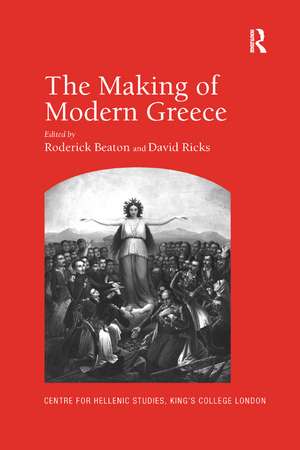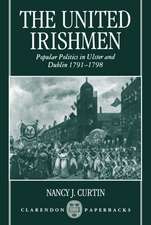The Making of Modern Greece: Nationalism, Romanticism, and the Uses of the Past (1797–1896)
Autor David Ricks Editat de Roderick Beatonen Limba Engleză Paperback – 6 iun 2019
| Toate formatele și edițiile | Preț | Express |
|---|---|---|
| Paperback (1) | 336.40 lei 6-8 săpt. | |
| Taylor & Francis – 6 iun 2019 | 336.40 lei 6-8 săpt. | |
| Hardback (1) | 874.16 lei 6-8 săpt. | |
| Taylor & Francis – mai 2009 | 874.16 lei 6-8 săpt. |
Preț: 336.40 lei
Preț vechi: 386.77 lei
-13% Nou
Puncte Express: 505
Preț estimativ în valută:
64.39€ • 67.11$ • 53.60£
64.39€ • 67.11$ • 53.60£
Carte tipărită la comandă
Livrare economică 06-20 ianuarie 25
Preluare comenzi: 021 569.72.76
Specificații
ISBN-13: 9781138382725
ISBN-10: 1138382728
Pagini: 284
Dimensiuni: 156 x 234 x 15 mm
Greutate: 0.45 kg
Ediția:1
Editura: Taylor & Francis
Colecția Routledge
Locul publicării:Oxford, United Kingdom
ISBN-10: 1138382728
Pagini: 284
Dimensiuni: 156 x 234 x 15 mm
Greutate: 0.45 kg
Ediția:1
Editura: Taylor & Francis
Colecția Routledge
Locul publicării:Oxford, United Kingdom
Cuprins
Contents: Introduction, Roderick Beaton; Part I Nationalisms Compared: the View from the Early 21st Century: Paradigm nation: the study of nationalism and the 'canonization' of Greece, Paschalis M. Kitromilides; What the Greek model can, and cannot, do for the modern state: the German perspective, Suzanne Marchand; Modern nations and ancient models: Italy and Greece compared, Henrik Mouritsen. Part II Towards a National History: Greek and Western Perspectives: European historiographical influences upon the young Konstantinos Paparrigopoulos, Ioannis Koubourlis; Europe, the classical polis, and the Greek nation: Philhellenism and Hellenism in 19th-century Britain, Margarita Miliori. Part III Defining Identity (1): Religion and the Nation State: From resurrection to insurrection: 'sacred' myths, motifs, and symbols in the Greek war of independence, Marios Hatzopoulos; Revisiting religion and nationalism in 19th-century Greece, Effi Gazi. Part IV Defining Identity (2): Insiders vs. Outsiders: The notion of nation: the emergence of a national ideal in the narratives of 'inside' and 'outside' Greeks in the 19th century, Yanna Delivoria; From privileged outcasts to power players: the 'romantic' redefinition of the Hellenic nation in the mid-19th century, Socrates D. Petmezas; Model nation and caricature state: competing Greek perspectives on the Balkans and Hellas (1797-1896), Basil C. Gounaris. Part V The Colonial Experience: Politics and Society in the Ionian Islands: Radical nationalism in the British protectorate of the Ionian islands (1815-1864), Eleni Calligas; Class and national identities in the Ionian islands under British rule, Athanasios Gekas. Part VI Language and National Identity: A language in the image of the nation: modern Greek and some parallel cases, Peter Mackridge; The language question and the diaspora, Karen van Dyke. Part VII The Nation in the Literary Imagination: The nation between utopia and art: canonizing Dionysios Solomos as the 'nationa
Notă biografică
Roderick Beaton is Koraes Professor of Modern Greek and Byzantine History, Language and Literature, and David Ricks is Senior Lecturer in Modern Greek Studies, both in the Department of Byzantine and Modern Greek Studies, King's College London, UK.
Recenzii
'[This] publication is welcome for it provides students of modern Greek nationalism access to a set of uniformly excellent contributions ... all the essays are especially strong examples of carefully researched monographs that shed light on important aspects of the evolution of nineteenth-century nationalism.' Historein
Descriere
In 1821, when the banner of revolution was raised against the empire of the Ottoman Turks, the story of 'Modern Greece' is usually said to begin. Less well known is the international recognition given to Greece as an independent state with full sovereign rights, as early as 1830, placing Greece in the vanguard among the new nation-states of Europe. This book brings together scholars from a variety of disciplines to explore the contribution of characteristically 19th-century European modes of thought to the 'making' of Greece as a modern nation. It focuses on the themes of nationalism, romanticism and the uses of the Classical and Byzantine past in the construction of a durable national identity at once 'Greek' and 'modern'.















